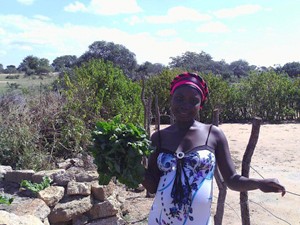
Every morning, 56-year-old Abby Ncube of the Matobo district in Zimbabwe spends at least an hour in her garden before doing household chores. Her homestead garden has become a source of livelihood for her family of 11; they get nutritious vegetables for every meal and are able to sell a surplus, meeting some basic household needs.
A number of factors constrain crop production in Matobo, chiefly excessive leaching of soil nutrients—but also drought. In Zimbabwe, USAID has introduced the homestead gardening technique that Abby uses. It includes raised keyhole beds to grow leafy vegetables; trenches for crops (e.g. okra); a conservation farming plot for small-scale production of staple crops (e.g. maize); and a compost pit to nourish the soil. Underneath the keyholes and trenches are layers of organic matter that add soil nutrients and help keep in moisture.
Abby's household is one of 172 families who embraced the homestead gardening approach introduced in Matobo by Catholic Relief Services and the Organization of Rural Associa-tions for Progress.
"This is a new approach that I appreciate very much," said Abby, who has planted spinach and onions in her keyholes, and tomatoes in the trenches. From her first harvest, she sold at least five bundles a day, at 5 Rand per bundle (about $0.50), and has added seven more garden trenches. This income allowed purchase of more seeds, and household basics such as salt, pens, and exercise books.
Abby's daughter-in-law, Sethule Mpofu, is also pleased with the program. "Before we had this garden, we used to plant vegetables at the dam site where we could get water, about 10km from our homestead. Now the garden is at our doorstep, we can prune some vegetables and cook for a visitor," she said.
Both women are thrilled with how well the children eat; now they can have fresh spinach with their daily sadza (maize). "Getting such nutrition every day is now enabling us to live a healthy life," said Sethule.







Comment
Make a general inquiry or suggest an improvement.